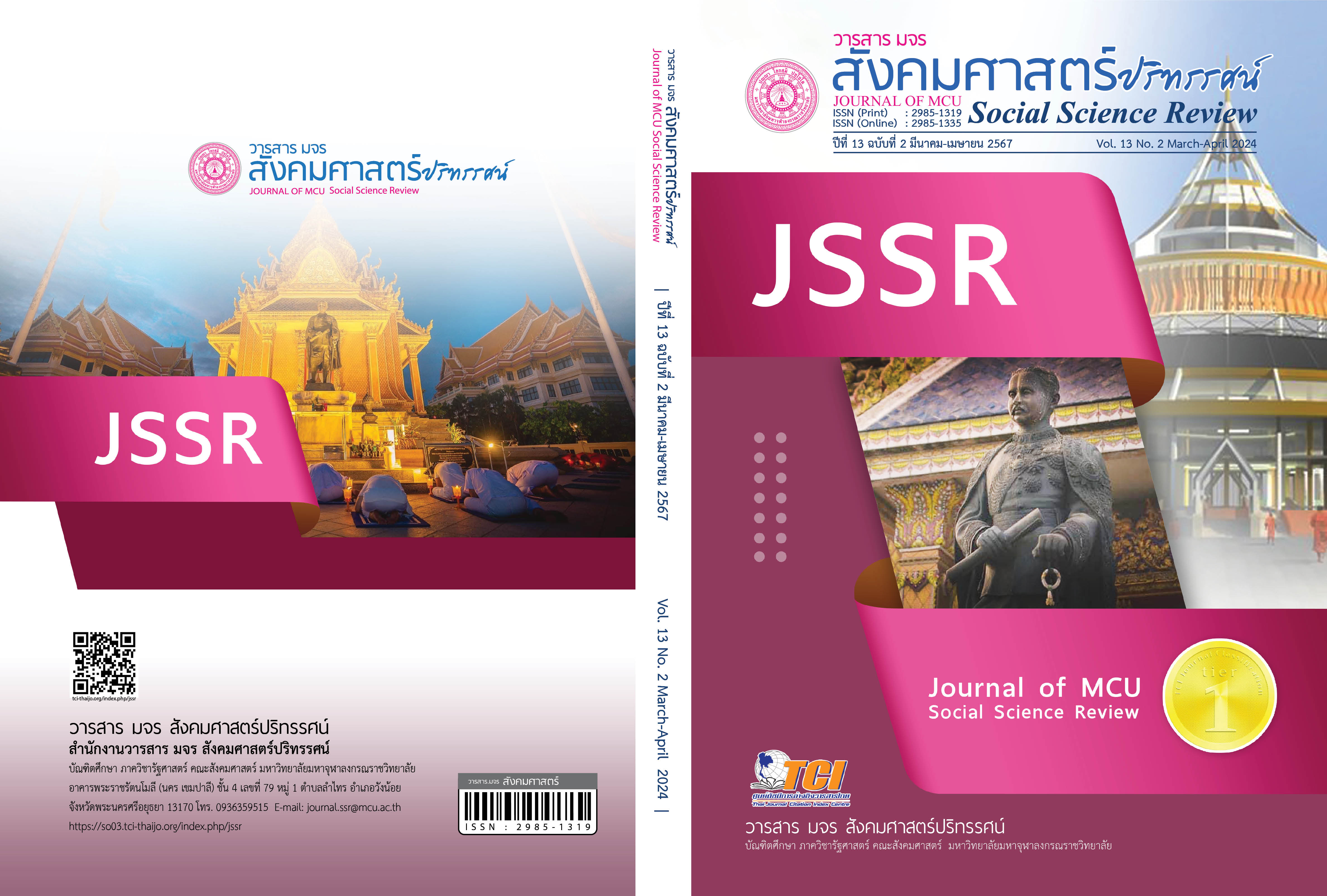การพัฒนาการจัดการศึกษาอาชีวศึกษาระบบทวิภาคี แผนกวิชาช่างยนต์ ระดับประกาศนียบัตรวิชาชีพชั้นสูง (ปวส.) ของวิทยาลัยการอาชีพ โดยใช้การวิจัยเชิงปฏิบัติการแบบมีส่วนร่วม
คำสำคัญ:
อาชีวศึกษา, ระบบทวิภาคี, การวิจัยเชิงปฏิบัติการแบบมีส่วนร่วมบทคัดย่อ
บทความวิจัยนี้มีวัตถุประสงค์ 1. พัฒนาการจัดการศึกษาอาชีวศึกษาระบบทวิภาคี แผนกวิชาช่างยนต์ ระดับประกาศนียบัตรวิชาชีพชั้นสูง (ปวส.) ของวิทยาลัยการอาชีพ โดยใช้การวิจัยเชิงปฏิบัติการแบบมีส่วนร่วม 2. ถอดบทเรียนปัจจัยแห่งความสำเร็จ ในการพัฒนาการจัดการศึกษาอาชีวศึกษาระบบทวิภาคี แผนกวิชาช่างยนต์ ระดับประกาศนียบัตรวิชาชีพชั้นสูง (ปวส.) ของวิทยาลัยการอาชีพ โดยใช้การวิจัยเชิงปฏิบัติการแบบมีส่วนร่วม วิธีดำเนินการวิจัยมี 3 ขั้น ได้แก่ ขั้นเตรียมการ ขั้นดำเนินงาน และขั้นการถอดบทเรียน ผู้ให้ข้อมูลได้แก่ ผู้วิจัยผู้ร่วมวิจัย นักพัฒนา สถานประกอบการ และชุมชน จำนวน 38 คน วิเคราะห์ข้อมูลด้วยการวิเคราะห์เนื้อหา
ผลการวิจัยพบว่า 1. การพัฒนาการจัดการศึกษาอาชีวศึกษาระบบทวิภาคี ผ่าน 6 กิจกรรม ประกอบด้วย การมีส่วนร่วมของผู้มีส่วนได้ส่วนเสีย การพัฒนาความเป็นเลิศในสาขางาน การพัฒนาทักษะที่เอื้อในการทำงาน การพัฒนาสมรรถนะภาษาต่างประเทศ และเทคโนโลยีที่จำเป็น การพัฒนาคุณธรรมและจริยธรรม รวมไปถึง การส่งเสริมผลสัมฤทธิ์ทางการเรียน และผลการถอดบทเรียน พบว่า ปัจจัยแห่งความสำเร็จในการพัฒนาการจัดการศึกษา ได้แก่ ทัศนคติของผู้บริหารสถานศึกษา การมอบนโยบายการจัดการศึกษาที่ชัดเจน ครูผู้สอนมีความเอาใจใส่มีการนิเทศ ติดตาม และ ร่วมกันแก้ไขปัญหากับสถานประกอบการ ผู้เรียน ผู้ปกครอง ให้ความร่วมมือและไว้วางใจในการจัดการเรียนการสอน สถานประกอบการให้ความร่วมมือในด้านบุคลากร วัสดุ เทคโนโลยี และการพัฒนาผู้เรียนด้านทักษะที่จำเป็นในการทำงาน สนับสนุนการจัดการเรียนการสอน มีสนับสนุนในการจัดการเรียนการสอนระบบทวิภาคีอย่างต่อเนื่อง
เอกสารอ้างอิง
เกียรติสุดา กาศเกษม. (2557). การพัฒนาชุมชนแห่งการเรียนรู้ในท้องถิ่นของโรงเรียนเทศบาลด้วยการวิจัยเชิงปฏิบัติการแบบมีส่วนร่วม (ดุษฎีนิพนธ์การศึกษาดุษฎีบัณฑิต สาขาการบริหารการศึกษา). พิษณุโลก: มหาวิทยาลัยนเรศวร.
เดชวิชัย พิมพ์โคตร. (2562). กลยุทธ์การบริหารเครือข่ายความร่วมมือเพื่อพัฒนาการจัดการศึกษาระบบทวิภาคีของสถานศึกษาอาชีวศึกษาของภาครัฐ (ดุษฎีนิพนธ์การศึกษาดุษฎีบัณฑิต สาขาการบริหารการศึกษา). ขอนแก่น: มหาวิทยาลัยขอนแก่น.
ธนนันท์ ธนารัชตะภูมิ และคณะ. (2562). การอาชีวศึกษา: ทวิภาคี และทวิศึกษา. Veridian E-Journal, Silpakorn University, 12(6), 244-263.
มนตรี คงเจริญ. (2559). การส่งเสริมนิสัยการรักการอ่านในโรงเรียนมัธยมศึกษา ด้วยการวิจัยเชิงปฏิบัติการแบบมีส่วนร่วม. วารสารมนุษยศาสตร์และสังคมศาสตร์, 23(2), 137-150.
เรวัช ศรีแสงอ่อน. (2564). การบริหารการจัดการเรียนรู้แบบบล็อกคอร์ส (Block Couse) วิทยาลัยเทคนิคลพบุรี. วารสารวิจัยและนวัตกรรม สถาบันการอาชีวศึกษา กรุงเทพมหานคร, 4(1), 133-150.
วรินทร พรหมสาขา ณ สกลนคร. (2564). การนำเสนอรูปแบบการพัฒนาการศึกษา 4.0 สำหรับโรงเรียนสังกัดสำนักงานเขตพื้นที่การศึกษามัธยมศึกษา เขต 24. วารสารวิชาการ มหาวิทยาลัยราชภัฏอุดรธานี, 9(1), 55-72.
ศูนย์อาชีวศึกษาทวิภาคี. (2557). แนวทางปฏิบัติการจัดการอาชีวศึกษาระบบทวิภาคีตามประกาศกระทรวงศึกษาธิการ. กรุงเทพฯ: โรงพิมพ์บริษัทจามจุรีโปรดักส์ จำกัด.
______. (2560). รายงานการผลการผลิตและพัฒนากำลังคนด้านอาชีวศึกษา. กรุงเทพฯ:คณะกรรมการการอาชีวศึกษา กระทรวงศึกษาธิการ.
______. (2561). คู่มือปฏิบัติงานการดำเนินงานสถานศึกษาต้นแบบทวิภาคี สานพลังประชารัฐ Excellent Model School. กรุงเทพฯ: โรงพิมพ์บริษัทจามจุรีโปรดักส์ จำกัด.
สำนักงานเลขาธิการสภาการศึกษา. (2560). รายงานการติดตามและประเมินผลการจัดการอาชีวศึกษาระบบทวิภาคี. กรุงเทพฯ: บริษัทพริกหวานกราฟฟิค จำกัด.
ดาวน์โหลด
เผยแพร่แล้ว
รูปแบบการอ้างอิง
ฉบับ
ประเภทบทความ
สัญญาอนุญาต
ลิขสิทธิ์ (c) 2024 วารสาร มจร สังคมศาสตร์ปริทรรศน์

อนุญาตภายใต้เงื่อนไข Creative Commons Attribution-NonCommercial-NoDerivatives 4.0 International License.
เพื่อให้เป็นไปตามกฎหมายลิขสิทธิ์ ผู้นิพนธ์ทุกท่านต้องลงลายมือชื่อในแบบฟอร์มใบมอบลิขสิทธิ์บทความให้แก่วารสารฯ พร้อมกับบทความต้นฉบับที่ได้แก้ไขครั้งสุดท้าย นอกจากนี้ ผู้นิพนธ์ทุกท่านต้องยืนยันว่าบทความต้นฉบับที่ส่งมาตีพิมพ์นั้น ได้ส่งมาตีพิมพ์เฉพาะในวารสาร มจร สังคมศาสตร์ปริทรรศน์ เพียงแห่งเดียวเท่านั้น หากมีการใช้ภาพหรือตารางหรือเนื้อหาอื่นๆ ของผู้นิพนธ์อื่นที่ปรากฏในสิ่งตีพิมพ์อื่นมาแล้ว ผู้นิพนธ์ต้องขออนุญาตเจ้าของลิขสิทธิ์ก่อน พร้อมทั้งแสดงหนังสือที่ได้รับการยินยอมต่อบรรณาธิการ ก่อนที่บทความจะได้รับการตีพิมพ์ หากไม่เป็นไปตามข้อกำหนดเบื้องต้น ทางวารสารจะถอดบทความของท่านออกโดยไม่มีข้อยกเว้นใดๆ ทั้งสิ้น





